

33 Things I Stole From People Smarter Than Me on the Way to 33 - RyanHoliday.net. Last year was the first year I really forgot how old I was.
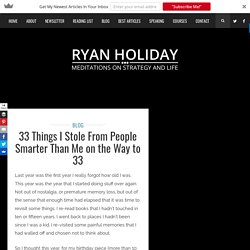
This year was the year that I started doing stuff over again. Not out of nostalgia, or premature memory loss, but out of the sense that enough time had elapsed that it was time to revisit some things. I re-read books that I hadn’t touched in ten or fifteen years. I went back to places I hadn’t been since I was a kid. ¿El miedo o el miedo te detiene? - Copyblogger. Comunicación no violenta. How did being happy become a matter of relentless competitive work? In 1920, the American psychologist John B Watson published the results of one of the more ethically dubious scholarly articles of the past century.
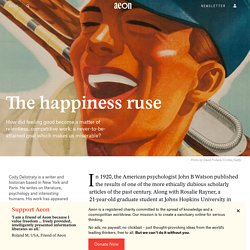
Along with Rosalie Rayner, a 21-year-old graduate student at Johns Hopkins University in Baltimore, where he taught, Watson aimed to instil a specific fear in an otherwise normal baby. Until then, behavioural conditioning had been exercised solely within the animal realm, but Watson and Rayner selected a nine-month-old boy they called ‘Albert’ for their study, paid his mother a dollar, and placed a variety of small, live animals in front of him, including a rat – in which he initially showed a playful interest.
As Albert played with the rat, the experimenters hit a nearby steel bar with a hammer, emitting a loud noise that scared the boy and made him cry. After doing this a few times, all the experimenters had to do to make Albert burst into tears was to show him the rat. Innovación, Diseño y Tendencias en la Red: dilemas y paradojas. POST Nº598.
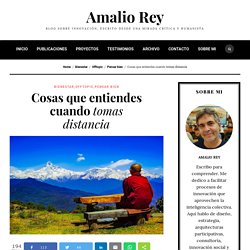
Why books don’t work. Books are easy to take for granted.
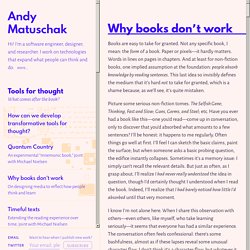
Not any specific book, I mean: the form of a book. Paper or pixels—it hardly matters. Words in lines on pages in chapters. And at least for non-fiction books, one implied assumption at the foundation: people absorb knowledge by reading sentences. This last idea so invisibly defines the medium that it’s hard not to take for granted, which is a shame because, as we’ll see, it’s quite mistaken.
Picture some serious non-fiction tomes. Meet the man living with Alzheimer’s who climbs the same mountain every day. The night before we are due to climb the Old Man of Coniston, Sion Jair calls to warn that, chances are, we won’t be able to go up the 803m Lake District fell in the morning.
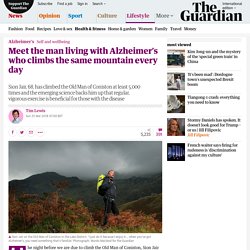
I look out the window of my hotel. Liderazgos opacos y la tiranía de la no estructura. Un error frecuente de las lecturas apologéticas de la participación colectiva es olvidarse que en las redes también se tejen y construyen relaciones de poder, y que éstas pueden llegar a ser tan desiguales como las que existen en estructuras tradicionales.

Internet no va a cambiar per se la naturaleza humana, ni nuestras carencias de fondo. De hecho, vemos que la arquitectura de la red vive en una tensión constante por reproducir los mismos modelos de asimetrías de poder que se dan en la vida analógica, lo cual es bastante lógico. Por eso, cada vez interiorizo más la necesidad de fijar pautas y normas claras, explícitas, en la gestión de iniciativas colectivas. La tiranía de la falta de estructuras. LA TIRANíA DE LA FALTA DE ESTRUCTURASPor Jo Freeman Traducción: Fany RubioPublicado por Forum de Política Feminista - La organización de las asociaciones de mujeres.Subido a la red por Mujeres en Red En los años de conformación del Movimiento de Liberación de la Mujer, se ha puesto especial énfasis en lo que se llama grupos sin Liderazgo y Estructura, como la principal si no la única forma organizativa del movimiento.
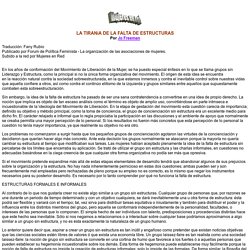
El origen de esta idea se encuentraen la reacción natural contra la sociedad sobreestructurada, en la que estamos inmersos y contra el inevitable control sobre nuestras vidas que aquella confiere a otros, así como contra el continúo elitismo de la izquierda y grupos similares entre aquellos que supuestamente combaten esta sobreestructuración. Sin embargo, la idea de la falta de estructura ha pasado de ser una sana contratendencia a convertirse en una idea de propio derecho. Al contrario de lo que nos gustaría creer no existe algo similar a un grupo sin estructuras. The Tyranny of Stuctureless. For everyone to have the opportunity to be involved in a given group and to participate in its activities the structure must be explicit, not implicit.
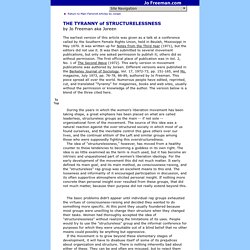
The rules of decision-making must be open and available to everyone, and this can happen only if they are formalized. This is not to say that formalization of a structure of a group will destroy the informal structure. It usually doesn't. But it does hinder the informal structure from having predominant control and make available some means of attacking it if the people involved are not at least responsible to the needs of the group at large. Declaración de Independencia del Ciberespacio, por John Perry Barlow. Gobiernos del Mundo Industrial, vosotros, cansados gigantes de carne y acero, vengo del Ciberespacio, el nuevo hogar de la Mente.
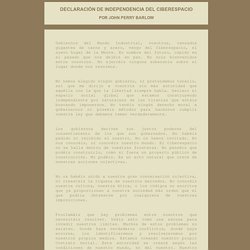
En nombre del futuro, ospido en el pasado que nos dejéis en paz. No sois bienvenidos entre nosotros. No ejercéis ninguna soberanía sobre el lugar donde nos reunimos. Sheryl Sandberg and Adam Grant on Resilience. Facebook COO Sheryl Sandberg talks about returning to work after her husband’s death, and Wharton management and psychology professor Adam Grant discusses what the research says about resilience.
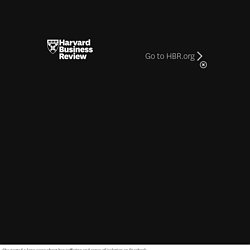
In this joint interview, they talk about how to build resilience in yourself, your team, and your organization. They’re the authors of the new book, Option B: Facing Adversity, Building Resilience, and Finding Joy. Download this podcast. Bluebrain. Cognitive bias cheat sheet – Better Humans. You don’t have to. But you can start by remembering these four giant problems our brains have evolved to deal with over the last few million years (and maybe bookmark this page if you want to occasionally reference it for the exact bias you’re looking for): Information overload sucks, so we aggressively filter.
Noise becomes signal.Lack of meaning is confusing, so we fill in the gaps. Signal becomes a story.Need to act fast lest we lose our chance, so we jump to conclusions. Stories become decisions.This isn’t getting easier, so we try to remember the important bits. In order to avoid drowning in information overload, our brains need to skim and filter insane amounts of information and quickly, almost effortlessly, decide which few things in that firehose are actually important and call those out. In order to construct meaning out of the bits and pieces of information that come to our attention, we need to fill in the gaps, and map it all to our existing mental models. Pensamiento Administrativo: 13 Tipos de preguntas para mejorar las habilidades sociales. Pensamiento Administrativo: 9 consejos basados en la compatía para enfrentarte a personas enojadas. Compatía. La solución para enfrentarte a personas enojadas. Por Santiago Moll. Pensamiento Administrativo: Desarrollo Personal: 10 cualidades que te harán una persona más resiliente.
(Recuperado desde Bligoo, QEPD)Por Santiago Moll Vaquer.Justifica tu Respuesta.Ser resiliente. ¡Vaya reto! No son pocos los artículos publicados en Justifica tu respuesta acerca de la resiliencia. Debo confesar que se trata de una capacidad que me tiene absolutamente fascinado porque trata de un modo directo la manera en la que las personas se sobreponen ante una adversidad.